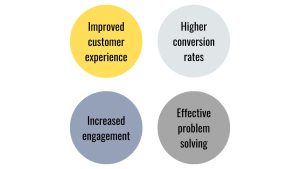content
AI development
January 22, 2025
6 min read
Introduction
In today’s digital world, customers expect more than standard services. They want personalised experiences that match their preferences. That’s where artificial intelligence (AI) comes in. AI personalisation is not just a trend; it’s a revolution that’s changing the way customers interact across industries. But how does it work and why is it so effective? Let’s dive into the details.
The Rise of Personalisation
In the past, businesses relied on broad marketing strategies. They often focused on general customer segments rather than individual customers. However, as technology advanced, the limitations of this approach became apparent. Customers wanted more. They sought relevance, convenience, and efficiency.
Artificial intelligence stepped in to fill this gap. By analysing vast amounts of data, AI systems can now predict what customers want, often before they even realise it. This transformation is making the customer experience richer and more meaningful.

How AI Personalisation Works
AI personalisation is based on three main principles:
- Data collection. The process starts with data collection. Every interaction, purchase, and click yields valuable information. AI systems collect this information to understand customer behavior.
- Data analysis. After data is collected, AI tools analyse it in real time. They identify patterns, preferences, and trends. For example, if a customer frequently buys sports equipment, the system recognises this interest.
- Insights. After analysing, AI generates recommendations or customises the experience. This could mean personalised product suggestions, tailored marketing emails, or even dynamic website content.
Applications of AI Personalisation
AI personalisation is making waves in various industries. Here are some key examples:
E-commerce
Online retailers are using AI to recommend products. For example, platforms like Amazon suggest products based on browsing and purchase history. This not only increases sales but also improves customer satisfaction.
Entertainment
Streaming services like Netflix and Spotify tailor content to each user. By analysing their viewing or listening habits, they ensure that each recommendation is personalised.
Healthcare
AI is helping patients receive personalised care. For example, apps track health data and offer fitness programs or diet plans tailored to individual needs.
Finance
Financial institutions are using AI to provide personalised investment advice. They also offer personalised credit card or loan recommendations based on their spending habits.
Education
Learning platforms like Duolingo or Coursera adapt lessons to individual progress. This keeps students engaged and motivated.
Benefits of AI Personalisation
AI personalisation offers a number of benefits for both businesses and customers.
- Improved customer experience. Personalised interactions feel more authentic. They show that a business cares about individual preferences.
- Increased engagement. When content is relevant to customers, engagement increases. Customers are more likely to return to a platform that understands them.
- Higher conversion rates. Targeted recommendations often help speed up decision-making. This leads to improved sales and revenue.
- Effective problem solving. AI tools predict problems and suggest solutions in advance. For example, chatbots can provide instant assistance, reducing customer frustration.

Challenges to Overcome
Despite its benefits, AI personalisation faces some obstacles:
- Privacy. Collection of personal data raises questions about security and consent. Companies should prioritise transparency and ethical practices.
- Algorithmic bias. If AI systems are poorly designed, they can reinforce bias. To avoid this, constant monitoring and improvement are necessary.
- Technical barriers. Implementing AI requires significant resources and expertise. Smaller businesses may struggle to keep up.
Future of AI Personalisation
The path to AI personalisation has only just begun. As technology advances, its application will become even more complex. Here’s what we can expect in the near future:
- Voice personalisation. Voice assistants like Alexa or Google Assistant will become even smarter. They will learn individual speech styles and preferences.
- Real-time adaptation. AI systems will provide hyper-personalised experiences in real time. For example, online stores can instantly adjust prices or offers based on user behavior.
- Deeper emotional understanding. AI will analyse emotions using facial recognition or tone of voice. This will provide more responsive interactions with customers.

Conclusion
AI personalisation is no longer optional. It is a necessity for companies that want to remain competitive. By providing customised experiences, companies can build stronger relationships with their customers. The key to success is balancing innovation with ethical practices. As this technology matures, its potential to transform the customer experience will only grow.
Companies that embrace AI personalisation today will shape the future of customer engagement tomorrow.
If you have any questions or an idea for a AI development project, contact us via sales@instandart.com or fill out the form on the main page of the site to discuss. We are always ready to help!
